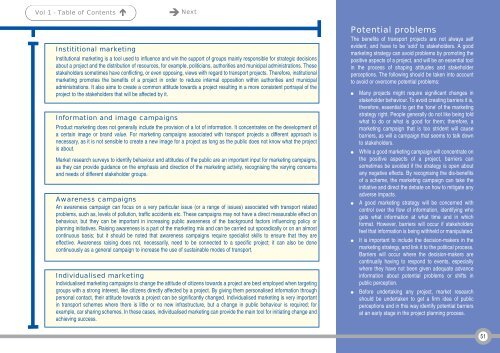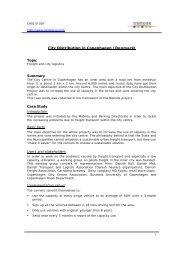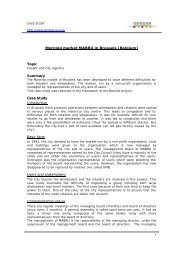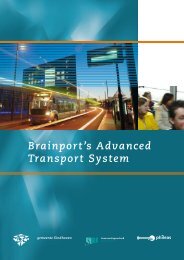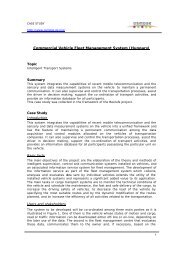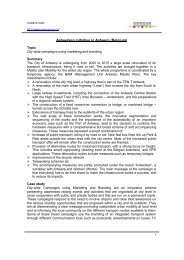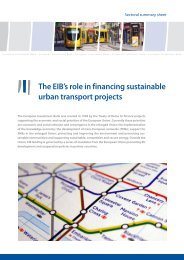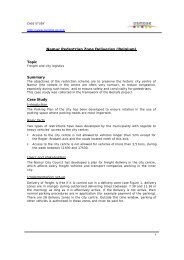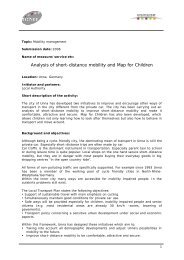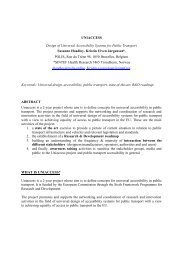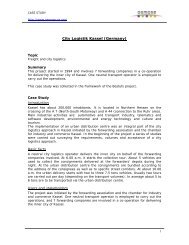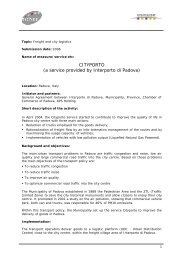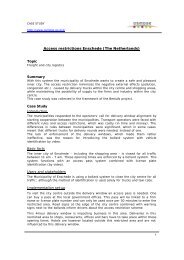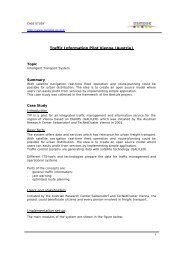Successful transport decision-making - Osmose
Successful transport decision-making - Osmose
Successful transport decision-making - Osmose
Create successful ePaper yourself
Turn your PDF publications into a flip-book with our unique Google optimized e-Paper software.
Vol 1 - Table of Contents <br />
Next<br />
Instititional marketing<br />
Institutional marketing is a tool used to influence and win the support of groups mainly responsible for strategic <strong>decision</strong>s<br />
about a project and the distribution of resources, for example, politicians, authorities and municipal administrations. These<br />
stakeholders sometimes have conflicting, or even opposing, views with regard to <strong>transport</strong> projects. Therefore, institutional<br />
marketing promotes the benefits of a project in order to reduce internal opposition within authorities and municipal<br />
administrations. It also aims to create a common attitude towards a project resulting in a more consistent portrayal of the<br />
project to the stakeholders that will be affected by it.<br />
Information and image campaigns<br />
Product marketing does not generally include the provision of a lot of information. It concentrates on the development of<br />
a certain image or brand value. For marketing campaigns associated with <strong>transport</strong> projects a different approach is<br />
necessary, as it is not sensible to create a new image for a project as long as the public does not know what the project<br />
is about.<br />
Market research surveys to identify behaviour and attitudes of the public are an important input for marketing campaigns,<br />
as they can provide guidance on the emphasis and direction of the marketing activity, recognising the varying concerns<br />
and needs of different stakeholder groups.<br />
Awareness campaigns<br />
An awareness campaign can focus on a very particular issue (or a range of issues) associated with <strong>transport</strong> related<br />
problems, such as, levels of pollution, traffic accidents etc. These campaigns may not have a direct measurable effect on<br />
behaviour, but they can be important in increasing public awareness of the background factors influencing policy or<br />
planning initiatives. Raising awareness is a part of the marketing mix and can be carried out sporadically or on an almost<br />
continuous basis; but it should be noted that awareness campaigns require specialist skills to ensure that they are<br />
effective. Awareness raising does not, necessarily, need to be connected to a specific project; it can also be done<br />
continuously as a general campaign to increase the use of sustainable modes of <strong>transport</strong>.<br />
Individualised marketing<br />
Individualised marketing campaigns to change the attitude of citizens towards a project are best employed when targeting<br />
groups with a strong interest, like citizens directly affected by a project. By giving them personalised information through<br />
personal contact, their attitude towards a project can be significantly changed. Individualised marketing is very important<br />
in <strong>transport</strong> schemes where there is little or no new infrastructure, but a change in public behaviour is required; for<br />
example, car sharing schemes. In these cases, individualised marketing can provide the main tool for initiating change and<br />
achieving success.<br />
Potential problems<br />
The benefits of <strong>transport</strong> projects are not always self<br />
evident, and have to be 'sold' to stakeholders. A good<br />
marketing strategy can avoid problems by promoting the<br />
positive aspects of a project, and will be an essential tool<br />
in the process of shaping attitudes and stakeholder<br />
perceptions. The following should be taken into account<br />
to avoid or overcome potential problems:<br />
<br />
<br />
<br />
<br />
<br />
Many projects might require significant changes in<br />
stakeholder behaviour. To avoid creating barriers it is,<br />
therefore, essential to get the 'tone' of the marketing<br />
strategy right. People generally do not like being told<br />
what to do or what is good for them; therefore, a<br />
marketing campaign that is too strident will cause<br />
barriers, as will a campaign that seems to talk down<br />
to stakeholders.<br />
While a good marketing campaign will concentrate on<br />
the positive aspects of a project, barriers can<br />
sometimes be avoided if the strategy is open about<br />
any negative effects. By recognising the dis-benefits<br />
of a scheme, the marketing campaign can take the<br />
initiative and direct the debate on how to mitigate any<br />
adverse impacts.<br />
A good marketing strategy will be concerned with<br />
control over the flow of information, identifying who<br />
gets what information at what time and in which<br />
format. However, barriers will occur if stakeholders<br />
feel that information is being withheld or manipulated.<br />
It is important to include the <strong>decision</strong>-makers in the<br />
marketing strategy, and link it to the political process.<br />
Barriers will occur where the <strong>decision</strong>-makers are<br />
continually having to respond to events, especially<br />
where they have not been given adequate advance<br />
information about potential problems or shifts in<br />
public perception.<br />
Before undertaking any project, market research<br />
should be undertaken to get a firm idea of public<br />
perceptions and in this way identify potential barriers<br />
at an early stage in the project planning process.<br />
51


